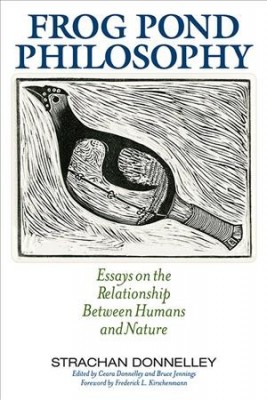| Frog Pond Philosophy: Essays on the Relationship Between Humans and Nature Contributor(s): Donnelley, Strachan (Author), Donnelley, Ceara (Editor), Jennings, Bruce (Editor) |
|
 |
ISBN: 0813167272 ISBN-13: 9780813167275 Publisher: University Press of Kentucky OUR PRICE: $79.20 Product Type: Hardcover - Other Formats Published: February 2018 |
| Additional Information |
| BISAC Categories: - Nature | Essays - Nature | Environmental Conservation & Protection - General - Philosophy | Ethics & Moral Philosophy |
| Dewey: 304.201 |
| LCCN: 2017052027 |
| Series: Culture of the Land |
| Physical Information: 0.9" H x 6.1" W x 9.1" (1.01 lbs) 266 pages |
| Themes: - Topical - Ecology |
| Descriptions, Reviews, Etc. |
| Publisher Description: The philanthropist and philosopher Strachan Donnelley (1942--2008) devoted his life to studying the complex relationship between humans and nature. Founder and first president of the Center for Humans and Nature, Donnelley was a pioneer in the exploration and promotion of the idea that human beings individually and collectively have moral and civic responsibilities to natural ecosystems. In this wide-ranging volume, Donnelley traces the connections between influential figures such as Aldo Leopold and Charles Darwin, as well as lesser-known but original thinkers that he met during the course of a full life -- ministers at his church, friends with whom he fished, and colleagues who shared his passion for research and writing. He grounds his work in classic philosophers such as Descartes, Spinoza, and Whitehead and reinterprets their writings about the natural world to develop a conservation-centered philosophy, which he dubs "democratic ecological citizenship." Edited by his daughter, Ceara Donnelley, and Bruce Jennings, Frog Pond Philosophy illuminates the dominant strands of Donnelley's intellectual identity as a philosopher, naturalist, agitator, and spiritualist. Despite his often grim depiction of the current state of the environment, Donnelly never surrenders his faith in humanity's ability to meet its ethical obligations to conserve, respect, and nurture the complexity and diversity of the natural world. His vivid and personal essays, rooted in everyday experiences, offer a distinctive perspective on questions of urgent contemporary importance. |